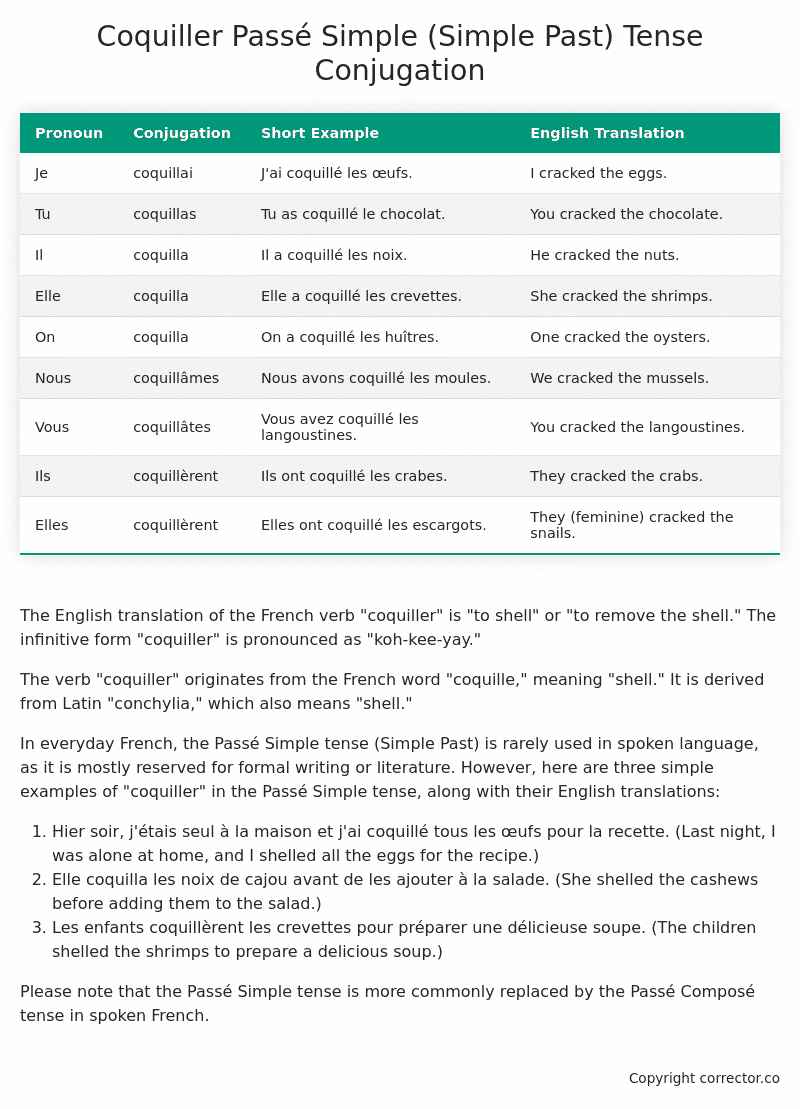Passé Simple (Simple Past) Tense Conjugation of the French Verb coquiller
Introduction to the verb coquiller
The English translation of the French verb “coquiller” is “to shell” or “to remove the shell.” The infinitive form “coquiller” is pronounced as “koh-kee-yay.”
The verb “coquiller” originates from the French word “coquille,” meaning “shell.” It is derived from Latin “conchylia,” which also means “shell.”
In everyday French, the Passé Simple tense (Simple Past) is rarely used in spoken language, as it is mostly reserved for formal writing or literature. However, here are three simple examples of “coquiller” in the Passé Simple tense, along with their English translations:
- Hier soir, j’étais seul à la maison et j’ai coquillé tous les œufs pour la recette. (Last night, I was alone at home, and I shelled all the eggs for the recipe.)
- Elle coquilla les noix de cajou avant de les ajouter à la salade. (She shelled the cashews before adding them to the salad.)
- Les enfants coquillèrent les crevettes pour préparer une délicieuse soupe. (The children shelled the shrimps to prepare a delicious soup.)
Please note that the Passé Simple tense is more commonly replaced by the Passé Composé tense in spoken French.
Table of the Passé Simple (Simple Past) Tense Conjugation of coquiller
| Pronoun | Conjugation | Short Example | English Translation |
|---|---|---|---|
| Je | coquillai | J’ai coquillé les œufs. | I cracked the eggs. |
| Tu | coquillas | Tu as coquillé le chocolat. | You cracked the chocolate. |
| Il | coquilla | Il a coquillé les noix. | He cracked the nuts. |
| Elle | coquilla | Elle a coquillé les crevettes. | She cracked the shrimps. |
| On | coquilla | On a coquillé les huîtres. | One cracked the oysters. |
| Nous | coquillâmes | Nous avons coquillé les moules. | We cracked the mussels. |
| Vous | coquillâtes | Vous avez coquillé les langoustines. | You cracked the langoustines. |
| Ils | coquillèrent | Ils ont coquillé les crabes. | They cracked the crabs. |
| Elles | coquillèrent | Elles ont coquillé les escargots. | They (feminine) cracked the snails. |
Other Conjugations for Coquiller.
Le Present (Present Tense) Conjugation of the French Verb coquiller
Imparfait (Imperfect) Tense Conjugation of the French Verb coquiller
Passé Simple (Simple Past) Tense Conjugation of the French Verb coquiller (You’re reading it right now!)
Passé Composé (Present Perfect) Tense Conjugation of the French Verb coquiller
Futur Simple (Simple Future) Tense Conjugation of the French Verb coquiller
Futur Proche (Near Future) Tense Conjugation of the French Verb coquiller
Plus-que-parfait (Pluperfect) Tense Conjugation of the French Verb coquiller
Passé Antérieur (Past Anterior) Tense Conjugation of the French Verb coquiller
Futur Antérieur (Future Anterior) Tense Conjugation of the French Verb coquiller
Subjonctif Présent (Subjunctive Present) Tense Conjugation of the French Verb coquiller
Subjonctif Passé (Subjunctive Past) Tense Conjugation of the French Verb coquiller
Subjonctif Imparfait (Subjunctive Imperfect) Tense Conjugation of the French Verb coquiller
Subjonctif Plus-que-parfait (Subjunctive Pluperfect) Tense Conjugation of the French Verb coquiller
Conditionnel Présent (Conditional Present) Tense Conjugation of the French Verb coquiller
Conditionnel Passé (Conditional Past) Tense Conjugation of the French Verb coquiller
Conditionnel Passé II (Conditional Past II) Tense Conjugation of the French Verb coquiller
L’impératif Présent (Imperative Present) Tense Conjugation of the French Verb coquiller
L’impératif Passé (Imperative Past) Tense Conjugation of the French Verb coquiller
L’infinitif Présent (Infinitive Present) Tense Conjugation of the French Verb coquiller
L’infinitif Passé (Infinitive Past) Tense Conjugation of the French Verb coquiller
Le Participe Présent (Present Participle) Tense Conjugation of the French Verb coquiller
Le Participe Passé (Past Participle) Tense Conjugation of the French Verb coquiller
Struggling with French verbs or the language in general? Why not use our free French Grammar Checker – no registration required!
Get a FREE Download Study Sheet of this Conjugation 🔥
Simply right click the image below, click “save image” and get your free reference for the coquiller Passé Simple tense conjugation!

Coquiller – About the French Passé Simple (Simple Past) Tense
Formation
Usage
Narration
Historical Context
Interactions with other tenses
Passé Composé
Imparfait
Conditional and Subjunctive
Summary
I hope you enjoyed this article on the verb coquiller. Still in a learning mood? Check out another TOTALLY random French verb conjugation!


